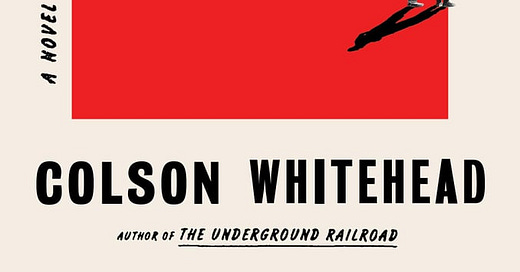This week I virtually sat down with my friend Sara Skidmore and the renowned interviewer of my imagination, Eugene Bellinger, to talk about Colson Whitehead’s 9th book, The Nickel Boys.
The Nickel Boys by Colson Whitehead
Published 2019 | 213 pages
Tags: Historical fiction, Racial Justice, Pulitzer Prize winner
Eugene Bellinger: Let's get to know you both a little bit. Tell us a little about yourself, your reading habits, what you like/dislike in a book.
Kyle: Well Euguene, I’ve loved books for as long as I can remember. I really love reading a book and seeing the screen adaptation and I expect this will be a movie someday. I like what most people like in a book: A great story and interesting characters.
Sara: I read different kinds of books and have no strong preference for either fiction or non-fiction. The only genre I don’t like or have experience with is sci-fi. I’m big on character more than plot and I like characters who are relatable.
Eugene: How did you discover The Nickel Boys and what made you decide to read it?
Sara: I saw it on Goodreads where a friend had read it and really liked it. I had started the author’s other Pulitzer winner, The Underground Railroad, and intend on finishing it someday…
Kyle: I had also heard of Colson Whitehead when The Underground Railroad was receiving acclaim and success back in 2016. I wanted to read that one first, but most of my book club had already read it so we landed on this one instead.
Eugene: What are your hot takes of The Nickel Boys?
Kyle: I’m not a fan of books where the characters are made to suffer all kinds of unspeakable horrors that seem to go on and on. The constant suffering at the hands of one-dimensional, evil masters is not interesting to me. I was pleasantly surprised that The Nickel Boys, while grim, wasn’t heavy-handed. It had plenty of suffering, cruelty, and abuse but was presented in a way that wasn’t excruciating to read.
Sara: Yeah, I can do bleak but I need beautiful or hopeful moments mixed in. This was on track to be nothing but bleak but had a redemptive ending that was a satisfying pay-off to the bleakness.
Eugene: The book is set in the 1960s but did you find anything relevant to today's culture?
Sara: I read The Sun Does Shine last year and one thing I took from it was this idea of privilege and being able to plan your life and live your plan. I used to think if anyone works hard they can get to do what they want. Stories like Elwood’s in The Nickel Boys and Anthony’s in The Sun Does Shine are a reminder that not everyone has the privilege to make a plan and live the life they want without systemic racism getting in the way.
Kyle: That’s a great point. Even though Elwood is a fictional character, he represents so many people of color who were and are mistreated by the justice system and severely impacted.
Sara: This book also made me think of the crisis at the border with children being separated from parents and being put in terrible situations and environments. I’ve seen people comment on that situation by saying that illegal immigrants somehow don’t feel the same about separation that, say, a white family would feel. Like it doesn’t “affect them” as much. Which sounds to me like we are stripping people of their humanity to make ourselves feel better.
Elwood Curtis is a good kid and gets arrested for no reason and put in a correctional school where the authority figures didn’t see Black kids as being “as human” as themselves. The Black kids weren’t deserving of humanity and were less worthy of fair treatment.
So when I look at the border crisis I wonder…is that attitude really in the past? How much of it is still happening? We are still labeling people with “criminal” or “car thief” or “illegal immigrant” as a way to dehumanize and it’s hard for people to shake labels. We bury humanity in the labels.
Kyle: Absolutely. Just Mercy made the same point. And while The Nickel Boys is fiction, it’s based on a real reform school in Florida that operated for 111 years. It was finally shut down in 2011! They have uncovered 55 graves and counting on the grounds. It sounds like a nightmare and begs the question “what other injustices have happened or are happening that I have no idea about?” It’s scary. Google Dozier school.
STOP. THE REMAINING QUESTIONS SPOIL THE BOOK SO STOP READING IF YOU HAVEN’T READ IT!
SERIOUSLY THOUGH. DON’T DO THIS TO YOURSELF. READ IT FIRST.
Eugene: How did the major plot twist impact you? Did you see it coming?
Kyle: I’m going to get flak for this but it felt like a cheap shot. I could see Mr. Whitehead patting himself on the back for coming up with such a great twist and it left me feeling manipulated. The jumping forward and back in time structure made a lot more sense though.
Sara: Before I found out he was actually Turner, I didn’t like it. All of Elwood’s talent and optimism seemed wasted at the moving company. Knowing he was really Turner who wanted to live a good life for his friend and make him proud was an uplifting moment. Any other ending where Elwood makes it out of Nickel would have been too formulaic.
Kyle: I agree. I won’t go so far as to say I called it (cue the eye roll), but it was fishy that someone with Elwood’s personality and dreams ended up moving furniture. It made a lot more sense after the reveal. It serves far more than just a plot twist; there’s some nice symbolism at work as well.
Eugene: What did you think about his wife’s reaction? Was it realistic that she would have forgiven him for living a lie?
Sara: To me that felt unrealistic. If I found out my spouse was living a lie and not who he said he was, I’m not sure I could continue the relationship. I mean, I felt betrayed as a reader with two days of investment…if I had been married to the guy…deal breaker.
Eugene: The very last line comes full circle to an idea presented early on in the novel, namely the game Elwood played about seeing a person of color in the hotel restaurant. What did you think of that callback?
Kyle: This was my favorite part of the book and the one with the most emotional impact. Honestly, I was bored for about 90% of the book and then nearly broke down sobbing on the last page. I’m not sure what that means. I’m really glad that Turner, without knowing it, got to fulfill this dream for Elwood.
Sara: But…did Elwood’s dream come true? He’s dead! Turner is living a double life with double trauma. Maybe it’s up to us to decide if Elwood’s dream came true. There isn’t a clear-cut answer.
Kyle: Sure, and I’m deciding it did come true!
Sara: Haha, I’ll agree it was a cool moment but that game was an early reference that didn’t stick with me as everything else unfolded.
Eugene: Can I get your final ratings?
Kyle: It’s no A Gentleman in Moscow, but I liked it. It gets 3 stars from me. I may have read it too fast instead of letting it soak in. I read the large print edition so maybe the big words didn’t carry the same weight.
Sara: Ha, I read the large print too! I agree, they took the edge off and made it feel more juvenile even though it was adult subject matter. 4 stars from me because I really liked it and it was almost perfect but I had a few complaints.
That’s it for us! Have a great weekend and let us know what you thought of The Nickel Boys.
Kyle





